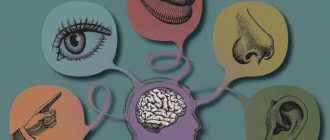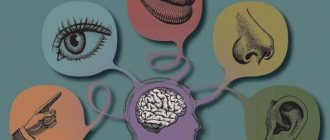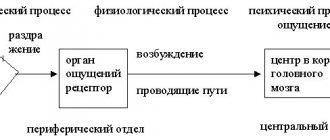One of the most important sources of knowledge of the world around us is its study with the help of the senses. The scientific name for this phenomenon is perception. It is known that the foundations of perception, that is, sensory perception, are laid in a person even while he is in the mother’s womb. With age, perception begins to play an increasingly important role in the worldview and the formation of a picture of the world.
Sensory perception of the world helps people correctly assess the situation
Perception in psychology
Perception in psychology is a person’s attitude to the world, which is formed under the influence of information received from the outside through the main sense organs. Translated from Latin, this word means “perception.” The opposite concept is apperception. A person needs to perceive the world correctly, because perception:
- helps to develop the right attitude towards people;
- promotes activation of cognitive function of the brain;
- promotes effective communication;
- makes it possible to correctly evaluate yourself and those around you.
This concept is one of the most studied in theoretical and practical psychology. Perception skills are formed from early childhood, so parents should give their child as much information as possible that can be learned through the senses. This could be music and various sounds, beautiful images, toys for the development of tactile skills.
Basic Concepts
Perceptivity is a basic biological process of the human psyche. This function is acquired through the senses, which take part in the formation of a complete image of objects. Perception influences the analyzers through a series of sensations caused by perception.
It is also worth saying that perceptivity is a popular subject of study among psychologists. After all, such a reflection of reality allows us to form a full-fledged image of a certain phenomenon in the human mind.
Definition, Pros and Cons
Reflection - what is it in psychology, definition
A perceptive person is a keenly feeling person. This state of mind has its advantages and disadvantages. Like the noun, the word perceptive comes from the Latin perceptio, meaning perception. The main disadvantage of a person with heightened senses is that even the slightest sound, visual or tactile stimulus can throw him off balance. The advantages are that such an individual can easily find a common language with any person, and is also very receptive to different types and genres of art. Parents and teachers should make the most of these qualities of the child and develop them. Typically, such individuals from childhood are distinguished by giftedness and talent in any particular field of activity.
Errors in perception (illusions)
There is nothing perfect in the world, and perception is no exception. For various reasons, this process can “fail” and give the individual erroneous images that do not correspond to reality.
There are two types of such violations:
- illusions are a perverted perception of existing objects and phenomena. Illusions, in turn, are: affectogenic - they are caused by feelings and emotions. For example, an anxious person may see an approaching maniac or monster in the shadow of a tree, hear a threat in someone else’s speech, a shy person will see criticism and shaming everywhere;
- pareidolic - the emergence of fantastic images when interacting with reality (blood in a glass instead of water, beetles instead of dirt stains). This type of illusion is a precursor to hallucinations.
This disorder is independently present only in mentally ill people - psychotics (for example, schizophrenics). The only condition under which a normal person can temporarily see hallucinations is a forced change in mental state (hypnosis, drugs).
Types of perception
In psychology, perceptual is associated with perception. Perceptual actions are actions aimed at sensory knowledge of the surrounding world. They can have a different character, depending on the type of perception. Experts distinguish three types of sensory knowledge of the surrounding world:
- cognition through vision;
- cognition through hearing;
- formation of a picture of the world using tactile sensations.
Self-control - what is it in psychology, definition
Knowing the leading type of sensory perception of the patient, the psychologist can easily find an individual approach to him. To do this, it is necessary to make maximum use of exactly that perceptual sphere to which a particular person is most sensitive, using exclusively auditory, visual or tactile stimuli and stimuli. This is not difficult to do; in modern practical psychology there are many ways to activate the work of various senses.
Interesting. People who are equally well developed in all types of sensory perception are extremely rare. Most often, one type is in the lead (for example, visual), other types fade into the background. A person who has no developed perception at all is also a very rare phenomenon.
Visual
A person who has a heightened visual perception of the world reacts especially vividly to any visual stimuli and irritants. As a rule, such people are interested in painting, love to look at pictures, have an excellent visual memory and remember people by their faces.
Auditory
A person who has the most developed auditory method of cognition of the world around him often has absolute pitch and easily reproduces any intonation he hears. Such people often connect their lives with music. The main disadvantage is increased sensitivity to loud and disharmonious sounds.
The perception of sounds plays an important role in the formation of a picture of the world
Tactile
There are people who, in order to remember information, must touch an object with their hands, feel it and remember their tactile sensations. In this case, we can talk about a heightened sense of touch. This type of perception develops especially strongly in early childhood, so exercises with children to improve fine motor skills have the most beneficial effect on memory and intelligence.
Note to parents
Forming a system of perceptual actions in a child is primarily the concern of parents. Firstly, they need to closely monitor the health of the baby’s sensory organs, otherwise their insufficient functioning will make it difficult to perceive the features of objects of cognition. Secondly, one should not rely only on educators and teachers: the development of perceptual actions is one of the goals of family education in the early stages of a child’s life. To do this, we need to help him thoroughly examine objects (what they sound like, how they are structured, what parts they are made of, what they feel, taste and smell), teach him how to operate them, and enrich his vocabulary with nouns (what is this?), adjectives (which one? ), verbs (what does it do?).
Children should be shown pictures and techniques of drawing, modeling, design, and practice comparing objects according to different parameters.
The main method of teaching toddlers and young children is play. Children love playing and doing activities together with their parents. Emotional substantive communication with them stimulates the child’s development of perceptual actions.
Social perception
Social perceptivity is the perception of another person through the prism of specific social attitudes and stereotypes. It is not always adequate. Perceptual actions are a broad concept, which, in particular, includes the assessment of others, focusing on existing norms in society.
Perceptual skills in social terms are skills that allow you to correctly perceive others. They will be useful for teachers, social workers, and psychological service workers. Mastering the essence of these skills is very important. To do this you need:
- be attentive to others;
- try to notice important details;
- perceive the external and internal world of a person as one whole.
All this will help create a correct understanding of other people and the composition of their psyche.
Intensive communication will help you understand another person.
Mechanisms of social perception
The main mechanisms of social perception are:
- thinking using stereotypes:
- reflexive mechanisms;
- empathy (projective ability to transfer the feelings of others);
- identification of a person with any type of personality.
With the help of these mechanisms, the individual sees others in one light or another.
Effects of social perception
Social perception, unlike physical perception, can be characterized by a person’s attitude towards the world around him and other people. The significance of this effect cannot be underestimated, since the simple or complex social adaptation of an individual largely depends on correct perception. Also, this phenomenon directly affects a person’s character and his level of sociability and openness.
The nature of the perception process
The external environment and its individual objects and phenomena influence the senses through analyzers. Their complex interaction ensures the flow of information into the brain centers and its processing.
Complex analysis and synthesis of external data ensure the creation of a holistic image: external and hidden, internal properties and qualities of the object are determined. That is, a number of its characteristics are formed.
The process of perceiving the same object is unique, as is its mental image, since they depend on the individual mental and physiological characteristics of a person. Life principles, views, motives, interests, preferences as the results of upbringing and lifestyle certainly determine the assessment of the properties and qualities of an object. For example, the same work of art can be emotionally assessed by different observers as “strikingly beautiful” and… “disgusting.”
Manifestations in relationships with others
All people have different perceptual abilities. This depends, in part, on genetics and culture. This quality can also be developed, which is especially important for people whose work is related to communication and teaching. For example, the perceptual abilities of a teacher are the skills of observation, to find an individual approach to each student, regardless of his academic performance, character, or nationality. In relationships with others, perceptive individuals demonstrate a high level of empathy - emotional empathy for the interlocutor.
A person with a high level of development of sensory perception easily finds a common language with others
The structure of perceptual action
Any process consists of individual operations - actions. The quality of the result depends on whether they are arranged in the correct sequence and performed without errors.
The process of perception includes a number of perceptual actions, this is due to the fact that a person needs:
- Consciously select information that is significant for him from the multitude that comes through sensory channels.
- Transform it in accordance with your own business objectives.
Perceptual action is several operations to transform sensory information.
Detection—detects the presence of a cognitive stimulus.
Discrimination - a perceptual standard is formed.
Next, the identification process takes place based on such actions as comparison and identification. The received image is compared with the one in memory and belongs to a certain class of objects, that is, it is categorized.
Mastering perceptual actions is a very difficult and lengthy process for a person, requiring special training.
Gender characteristics of perception
There are more perceptive personalities among women than among men. Therefore, women are more successful in teaching. This feature must be kept in mind when creating a favorable psychological climate in the team. Men, compared to women, have better developed tactile perception of the world and cognition through tactile experience.
Interesting. In Russia there is a saying that a woman loves with her ears, and a man loves with her eyes. This, in a nutshell, means that representatives of the stronger sex perceive verbal information (for example, compliments) best, while gentlemen are typical visual learners.
It is known that internal perception, useful in interpersonal relationships, as well as intuition, can be developed with the help of special training and spiritual practices, as well as a teacher-psychologist. During some psychological exercises, especially at a young or childhood age, for example, in preschoolers, the main senses begin to perceive the world around them more acutely. At such moments of learning, perception becomes the leading source of knowledge.
Characteristics and features of stereotyping
A social stereotype always underlies the formation of a first impression, be it a representative of a particular profession, or a foreigner representing his nation. Ethnic stereotypes are some of the most interesting. Italians are overly eccentric, and the British are prim.
It is important to understand that if an individual has adopted the stereotypes of his group for himself, then it is easier for him to perceive another person. In this case, the mechanism of perceiving another person starts easier and faster, saving time and psychological resources.
But stereotypes should not always be applied, there is a so-called permitted area, this can be professional activity or a group national characteristic. One of the most striking examples is a teacher. A calm student striving for knowledge is an ideal.
But other children are indifferent, unworthy of attention, generally negative people who are not worth wasting time on. These labels, which appear in an insecure adult, prevent the child from forming his own self and correctly presenting himself to the world.
Interaction with society through perception
Interaction with society through perception occurs as follows:
- Imperative communication. This is the desire to subjugate, establish control, and use various kinds of manipulation. This is an unveiled desire to coerce. This type of communication is sometimes justified, for example, statutory relations, extreme situations.
- If there are hidden motives in perception, then comes the turn of manipulation, the task of which is to hide the true reasons, replace them if necessary, and also achieve control over both the person and the situation. A communication partner is perceived only as a means to an end. In general, the manipulator is characterized by cruelty, apathy, and loss of interest in life. The teaching profession is partly manipulative, since the teacher needs to motivate and teach the lesson as interesting as possible. Such an attitude can have a detrimental effect on the interpersonal perceptions of the teacher and other people.
- Dialogue. Dialogue is a real equal interaction with society through perception; it is a fixation on another person, on his interests.
Analysis of communication and interaction with society through perception is diverse and multifunctional. It is important for every person and society as a whole. The structure of such interaction does not end with perception, it is also communication and interactivity. Perception is getting to know each other, establishing interpersonal relationships, exchanging emotions and ideas, which can be called feedback.
The concept of perception is a whole process in psychology by which we pay attention to some stimuli in our environment and not others. Because it is impossible to pay attention to all the stimuli the brain presents, the mind has an amazing unconscious ability to choose what is important and what is not.
Author: Elena Gupta











